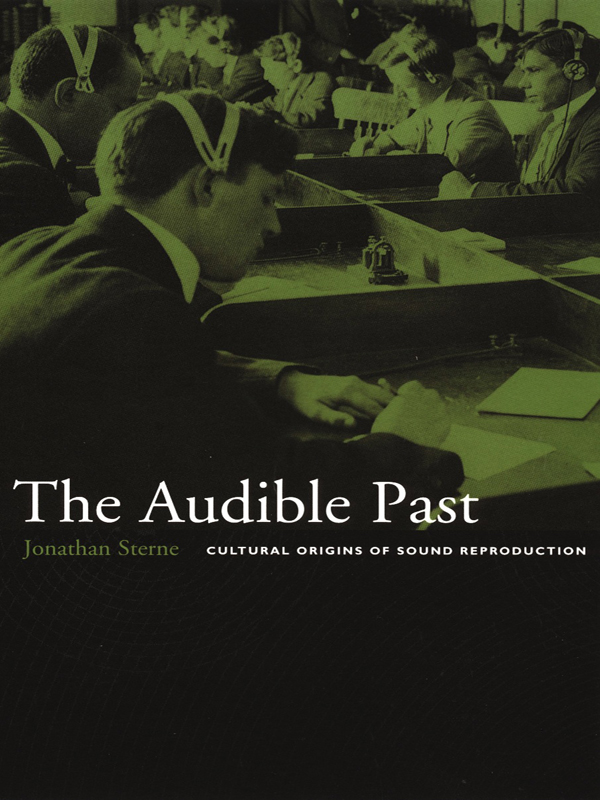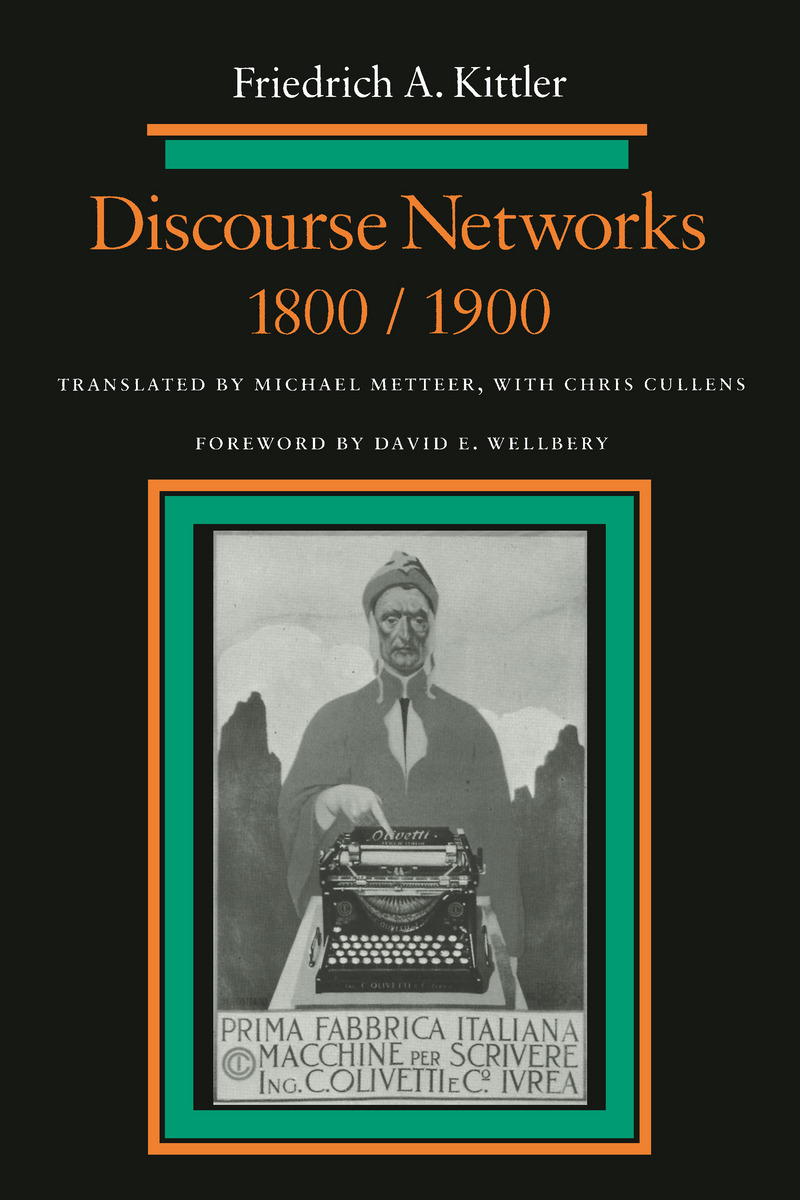Jonathan Sterne: The Audible Past: Cultural Origins of Sound Reproduction (2003)
Filed under book | Tags: · history of technology, listening, media technology, music, music history, phonograph, radio, sound, sound recording, technology, telegraphy, telephone

“The Audible Past explores the cultural origins of sound reproduction. It describes a distinctive sound culture that gave birth to the sound recording and the transmission devices so ubiquitous in modern life. With an ear for the unexpected, scholar and musician Jonathan Sterne uses the technological and cultural precursors of telephony, phonography, and radio as an entry point into a history of sound in its own right. Sterne studies the constantly shifting boundary between phenomena organized as “sound” and “not sound.” In The Audible Past, this history crisscrosses the liminal regions between bodies and machines, originals and copies, nature and culture, and life and death.
Blending cultural studies and the history of communication technology, Sterne follows modern sound technologies back through a historical labyrinth. Along the way, he encounters capitalists and inventors, musicians and philosophers, embalmers and grave robbers, doctors and patients, deaf children and their teachers, professionals and hobbyists, folklorists and tribal singers. The Audible Past tracks the connections between the history of sound and the defining features of modernity: from developments in medicine, physics, and philosophy to the tumultuous shifts of industrial capitalism, colonialism, urbanization, modern technology, and the rise of a new middle class.
A provocative history of sound, The Audible Past challenges theoretical commonplaces such as the philosophical privilege of the speaking subject, the visual bias in theories of modernity, and static descriptions of nature. It will interest those in cultural studies, media and communication studies, the new musicology, and the history of technology.”
Publisher Duke University Press, 2003
ISBN 082233013X, 9780822330134
450 pages
via nutzenberg
Reviews: James P. Kraft (American Historical Review), Karin Bijsterveld (Technology and Culture).
PDF (updated on 2022-12-7)
Comment (0)Friedrich A. Kittler: Discourse Networks 1800/1900 (1985–) [German, English]
Filed under book | Tags: · communication, discourse, history of literature, language, literary theory, literature, media, media archeology, media technology, media theory, philosophy, psychoanalysis, psychophysics, technology, writing

“This is a highly original book about the connections between historical moment, social structure, technology, communication systems, and what is said and thought using these systems–notably literature. Friedrich Kittler focuses on the differences between ‘discourse networks’ in 1800 and in 1900, in the process developing a new analysis of the shift from romanticism to modernism. The artful structure of the book begins with Goethe’s Faust and ends with Valéry’s Faust. In the 1800 section, the author discusses how language was learned, the emergence of the modern university, the associated beginning of the interpretation of contemporary literature, and the canonization of literature. Among the writers and works Kittler analyzes in addition to Goethe’s Faust are Schlegel, Hegel, E.T.A. Hoffman’s The Golden Pot, and Goethe’s Tasso. The 1900 section argues that the new discourse network in which literature is situated in the modern period is characterized by new technological media–film, the photograph, and the typewritten page–and the crisis that these caused for literary production. Along the way, the author discusses the work of Nietzsche, Gertrude Stein, Mallarmé, Bram Stroker, the Surrealists, Rilke, Kafka, and Freud, among others.”
Aufschreibesysteme 1800/1900
First published in 1985
Third, completely revised edition
Publisher Wilhelm Fink Verlag, Munich, 1995
ISBN 3770528816, 9783770528813
524 pages
Discourse Networks, 1800/1900
Translated by Michael Metteer, with Chris Cullens
Foreword by David E. Wellbery
Publisher Stanford University Press, 1990
ISBN 9780804720991
496 pages
Reviews: Franz Futterknecht and David Wellbery (Poetics Today, 1987, EN), Robert C. Holub (German Quarterly, 1987, EN), Thomas Sebastian (MLN, 1990, EN).
Wikipedia (DE)
Publisher (DE)
Publisher (EN)
Aufschreibesysteme 1800/1900 (German, 3rd ed., 1985/1995, removed on 2024-2-6 upon request from Brill)
Discourse Networks, 1800/1900 (English, 1990, updated to the full book on 2014-1-30 via poshumano, updated to single-page OCR’d version on 2014-1-31 via Marcell Mars)
Online version of Index of persons (at Monoskop wiki)
Comments (3)Marshall McLuhan: Understanding Media: The Extensions of Man (1964–) [EN, SC, CZ, DE, CR]
Filed under book | Tags: · advertising, film, global village, history of technology, mass media, media technology, media theory, money, new media, phonograph, photography, print, radio, technology, telegraphy, telephone, television

“When first published, Marshall McLuhan’s Understanding Media made history with its radical view of the effects of electronic communications upon man and life in the twentieth century. In Terrence Gordon’s own words, “McLuhan is in full flight already in the introduction, challenging us to plunge with him into what he calls ‘the creative process of knowing.'” Much to the chagrin of his contemporary critics McLuhan’s preference was for a prose style that explored rather than explained. Probes, or aphorisms, were an indispensable tool with which he sought to prompt and prod the reader into an “understanding of how media operates” and to provoke reflection.
In the 1960s McLuhan’s theories aroused both wrath and admiration. It is intriguing to speculate what he might have to say 40 years later on subjects to which he devoted whole chapters such as Television, The Telephone, Weapons, Housing and Money. Today few would dispute that mass media have indeed decentralized modern living and turned the world into a global village.”
First published in 1964
With a new introduction by Lewis H. Lapham
Publisher The MIT Press, 1994
ISBN: 0262631598, 9780262631594
392 pages
Understanding Media: The Extensions of Man (English, 1964/1994, updated on 2019-2-27)
Poznavanje opštila: čovekovih produžetaka (Serbo-Croatian, trans. Slobodan Đorđević, 1971, added on 2015-12-21)
Jak rozumět médiím: Extenze člověka (Czech, trans. Miloš Calda, 1991, added on 2014-3-13)
Die magischen Kanäle: Understanding Media (German, trans. Meinrad Amann, 1992, added on 2013-11-22)
Razumijevanje medija (Croatian, trans. David Prpa, 2008, added on 2013-11-22)

